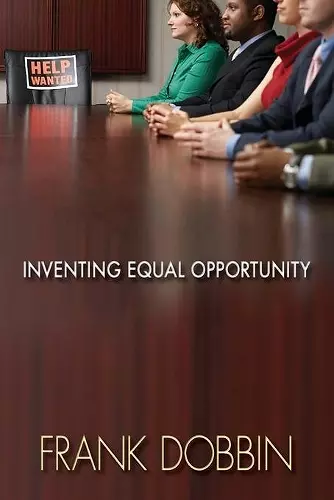Inventing Equal Opportunity
Format:Paperback
Publisher:Princeton University Press
Published:28th Jun '11
Currently unavailable, and unfortunately no date known when it will be back

Equal opportunity in the workplace is thought to be the direct legacy of the civil rights and feminist movements and the landmark Civil Rights Act of 1964. Yet, as Frank Dobbin demonstrates, corporate personnel experts--not Congress or the courts--were the ones who determined what equal opportunity meant in practice, designing changes in how employers hire, promote, and fire workers, and ultimately defining what discrimination is, and is not, in the American imagination. Dobbin shows how Congress and the courts merely endorsed programs devised by corporate personnel. He traces how the first measures were adopted by military contractors worried that the Kennedy administration would cancel their contracts if they didn't take "affirmative action" to end discrimination. These measures built on existing personnel programs, many designed to prevent bias against unionists. Dobbin follows the changes in the law as personnel experts invented one wave after another of equal opportunity programs. He examines how corporate personnel formalized hiring and promotion practices in the 1970s to eradicate bias by managers; how in the 1980s they answered Ronald Reagan's threat to end affirmative action by recasting their efforts as diversity-management programs; and how the growing presence of women in the newly named human resources profession has contributed to a focus on sexual harassment and work/life issues. Inventing Equal Opportunity reveals how the personnel profession devised--and ultimately transformed--our understanding of discrimination.
Co-Winner of the 2012 Distinguished Scholarly Publication Award, American Sociological Association Winner of the 2010 Max Weber Award in the Organizations, Occupations, and Work Section of the American Sociological Association One of Choice's Outstanding Academic Titles for 2009 "Frank Dobbin's impressive Inventing Equal Opportunity documents the crucial role played by the personnel profession in translating equal employment law into practice... Dobbin makes a powerful argument about the importance of long-overlooked personnel managers in creating the legal environment that governs so much of an American's working life."--Science "In this superb book, Dobbin explains the process through which white males have now become 'victims' of a system intended to uplift disadvantaged groups; at the same time, it reveals the fallacy of judicial neutrality in civil rights cases... Overall, Dobbin tells a clear, well-documented, fascinating story about workplace relations."--R.L. Hogler, Choice "Inventing Equal Opportunity provides a much needed corrective to our understanding of the workings of corporate America in the face of external pressures surrounding inequality and law... Consequent to [its] many strengths, I have no doubt that Inventing Equal Opportunity will find a welcome home on the 'must read' shelf among sociologists and graduate students of inequality, law, organizations, professions, and work."--Vincent J. Roscigno, Contemporary Sociology "Dobbin's book is an eye-opening account of how a professional group used demands for equal opportunity to expand its professional jurisdiction... Through their policies and programs, these experts heightened expectations for fair treatment and promoted a more sociological understanding of racism and sexism inside organizations."--Christine L. Williams, Gender and Society "This impressive book makes a convincing case for human resources professionals as key players in the implementation of civil rights laws."--Edward Berkowitz, Journal of Social History "Frank Dobbin has written a careful institutional analysis of how human resource professionals invented equal opportunity. The book is a pleasure to read and a field guide for what historically careful institutional analyses should look like. For institutionalists and law and society scholars the book is necessary reading. Inventing Equal Opportunity is likely to become one of the definitive books on the history of equal opportunity law and corporate personnel practice."--Donald Tomaskovic-Devey, American Journal of Sociology "This is an excellent, smart book attuned to the implications its argument has for our understanding of social movements, racial progress, and federalism."--Jennifer Delton, Journal of American History
- Joint winner of American Sociological Association - Organizations, Occupations and Work Section: Max Weber Award 2012
- Short-listed for Choice Magazine Outstanding Reference/Academic Book Award 2009
ISBN: 9780691149950
Dimensions: unknown
Weight: 482g
360 pages